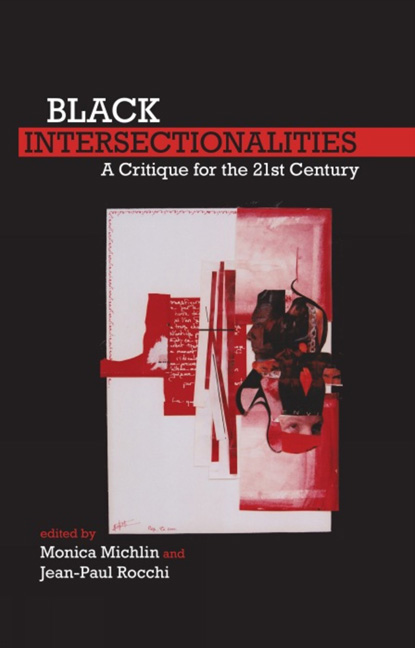Book contents
- Frontmatter
- Contents
- 1 Introduction: Theorizing for Change: Intersections, Transdisciplinarity, and Black Lived Experience
- 2 Exordium: Writing and the Relation: From Textual Coloniality to South African Black Consciousness
- I Challenging Hegemonic Gender Identities
- 3 Postcolonial Backlash and Being Proper: Femininity, Blackness, Sexuality, and Transgender in the Public Eye
- 4 Productive Investments: Masculinities and Economies in Fisher's The Walls of Jericho
- 5 “I Hugged Myself”: First-Person Narration as an Agential Act in Octavia Butler's “The Evening and the Morning and the Night”
- II Nonconformity and Narrative heorizing
- III Upsurges of Desire
- IV Epistemological Genealogies and Prospections
- Contributors
- Index
5 - “I Hugged Myself”: First-Person Narration as an Agential Act in Octavia Butler's “The Evening and the Morning and the Night”
from I - Challenging Hegemonic Gender Identities
- Frontmatter
- Contents
- 1 Introduction: Theorizing for Change: Intersections, Transdisciplinarity, and Black Lived Experience
- 2 Exordium: Writing and the Relation: From Textual Coloniality to South African Black Consciousness
- I Challenging Hegemonic Gender Identities
- 3 Postcolonial Backlash and Being Proper: Femininity, Blackness, Sexuality, and Transgender in the Public Eye
- 4 Productive Investments: Masculinities and Economies in Fisher's The Walls of Jericho
- 5 “I Hugged Myself”: First-Person Narration as an Agential Act in Octavia Butler's “The Evening and the Morning and the Night”
- II Nonconformity and Narrative heorizing
- III Upsurges of Desire
- IV Epistemological Genealogies and Prospections
- Contributors
- Index
Summary
This study gives an introduction to the complex interrelation of agency and first-person narration in the works of Octavia Butler by way of the short story “The Evening and the Morning and the Night” (1987). Butler's diverse oeuvre utilizes narrative perspective as it conspicuously employs complex constructions of homodiegetic narrations: in its discussion of notions of identity, power, control, and freedom, it gives voice to, among others, a runaway in a dystopian future in Survivor (1978), a black woman repeatedly forced to travel back to the times of slavery in Kindred (1979), a human–alien hybrid of a third gender in Imago (1989), a hyper-empathic young woman who founds a major religion in Parable of the Sower (1993) and Parable of the Talents (1998), and a black vampire–human hybrid in Fledgling (2006). As such, Butler's fictions, in how they narrate hybrid and intersectional species identities, are powerful examples of texts which “explore the complexity of what it means to be human” (see the Introduction to this volume), and her short story “The Evening and the Morning and the Night” provides a pertinent example of these dynamics.
The central theoretical category of my analysis is agency, which I define as an individual's capability to reach a decision about himself or herself and implement it. This ability is significantly expressed in agential acts, i.e., acts which address and problematize agency as such: agential acts are intended to achieve a higher level of agency, explicitly to express or perform agency. They mark a choice between several options, particularly in situations of oppression or determination. Thus constructed, agency is not simple voluntarism, a vague notion of doing what one wants, but rather an ability realized in a specific cultural and historical context and within a dialectic of enablement and constraint.
Historically, this ability is tied to and in fact conceptualized in combination with a specific notion of the subject; it is as an inherent attribute of the rational, autonomous, white man, the subject of the Enlightenment. However, even as this notion of the subject has been deconstructed in different postmodern schools of theory, allowing for some notion of agency remains a central theoretical challenge. Particularly to those theories centering on the political and cultural struggle for the equality of marginalized groups, such as feminism or Critical Race Theory, the deconstruction, sometimes even the negation, of the liberal humanist subject poses a significant problem.
- Type
- Chapter
- Information
- Black IntersectionalitiesA Critique for the 21st Century, pp. 68 - 82Publisher: Liverpool University PressPrint publication year: 2013



